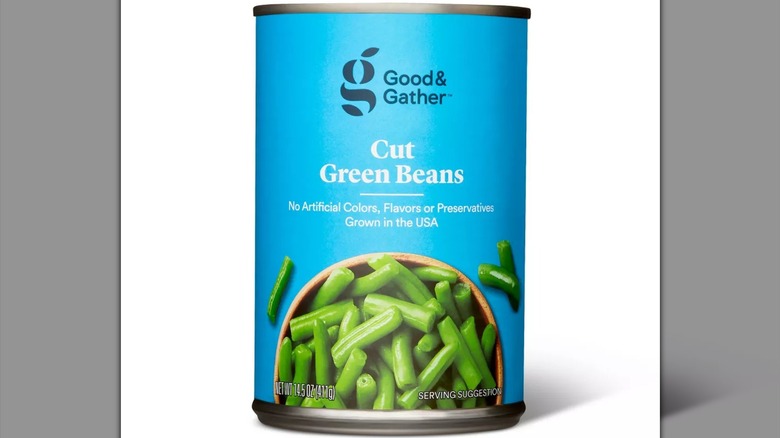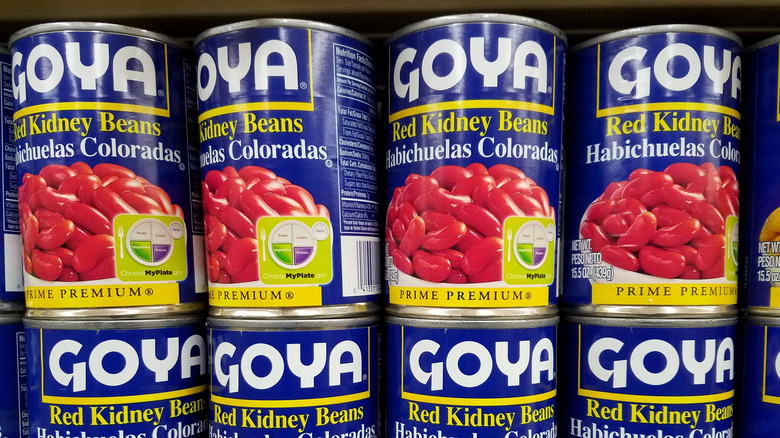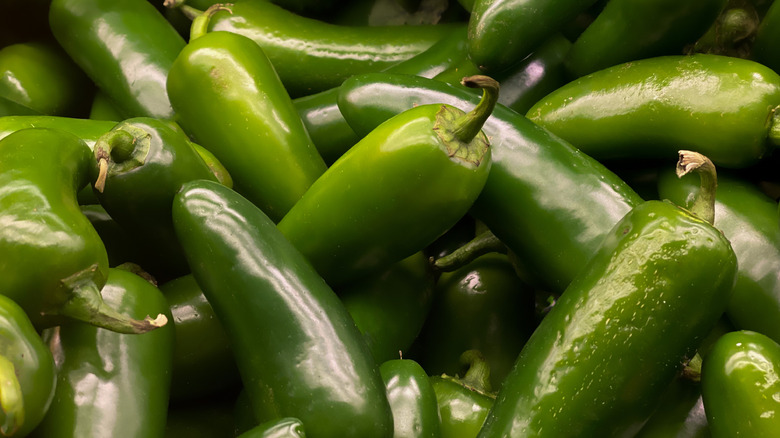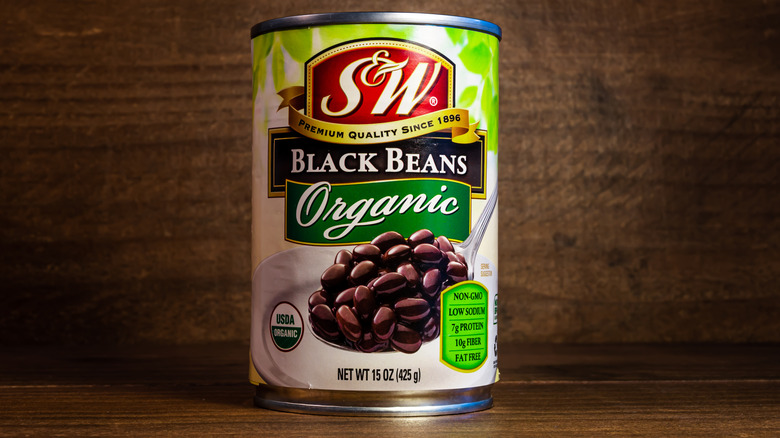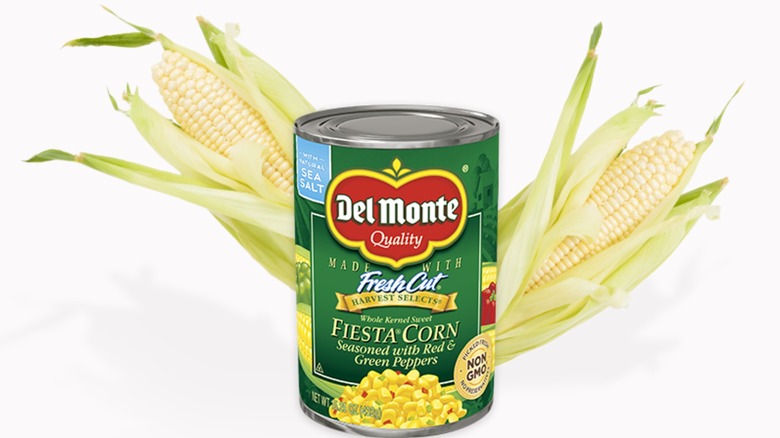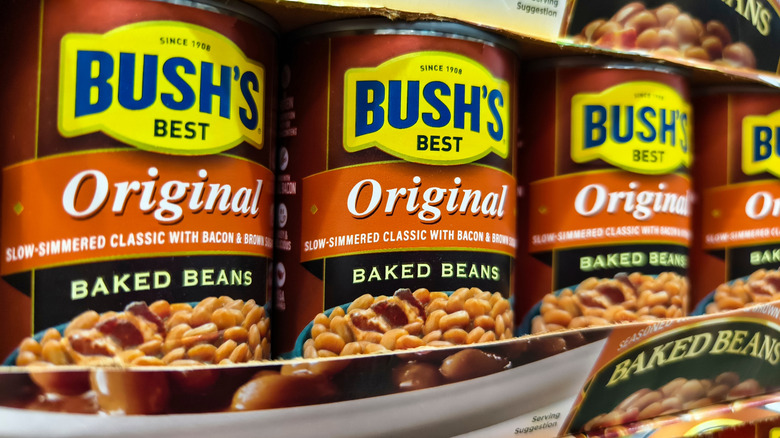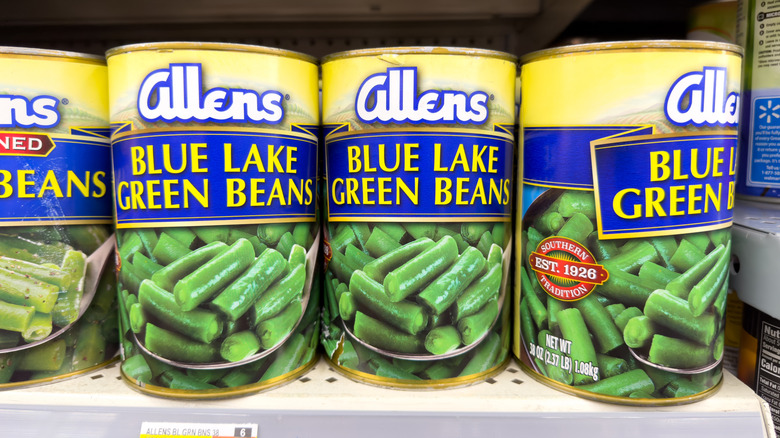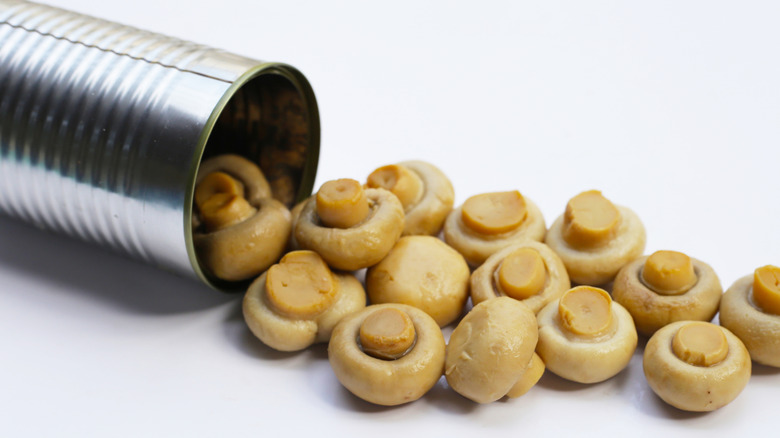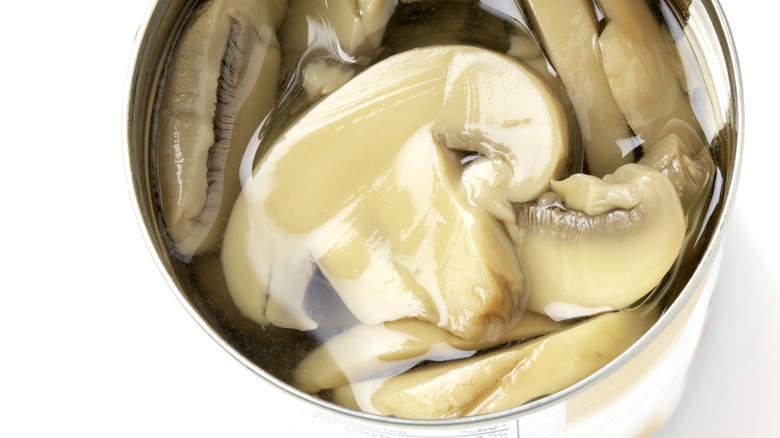The Biggest Canned Vegetable Recalls In US History
We may receive a commission on purchases made from links.
Canned vegetables are a convenient way to boost the nutritional content of a meal. Whether you're making pasta, a casserole, or chili, you can usually stir in some canned beans or peas with minimal effort. After all, the vegetables have usually been cooked and treated before they were canned.
But sometimes, things go wrong. In the past, people have opened their canned vegetables to discover foreign objects inside (including shards of glass), and other times, the seal has been broken or the cans have been swollen (likely due to the presence of harmful bacteria).
But don't panic about using your favorite canned vegetables, because usually, if a problem is discovered, products are recalled from the market very quickly. Often, they are pulled off the shelves before anyone can get sick or injured. If you want to learn more about the potential risks with canned vegetables, find some of the biggest recalls in history below. Spoiler alert: most of the recalls are to do with deadly bacteria.
More than 197,000 cans of green beans recalled from Target due to contamination (2025)
When you open a can of green beans, the last thing you want to find is a foreign object inside — but it does happen. In March 2025, for example, Del Monte Foods had to recall more than 197,000 cans of cut green beans, sold under Target's Good & Gather brand, due to fears they had been contaminated with a foreign object. At the time of the recall, the cans of beans had already been sent to Target stores in more than 20 states across the U.S.
The type of object in the beans was unspecified, but some of the most common examples of contaminants found in food products include things like plastic fragments, glass, rocks, and shards of metal. They all pose a choking risk, and could even cause internal injuries, too. The Food and Drug Administration (FDA) classified the Del Monte Foods recall as Class II, which means that the foreign object could cause consumers to experience temporary consequences, or consequences that require medical intervention to resolve. It is a step down from a Class I recall, which means the FDA determines there is a reasonable chance that the product could cause serious health consequences.
In a bid to protect consumers from injuries or choking, anyone who had already purchased the green beans from Target was urged not to consume them. Target stores were also instructed not to distribute the product any longer.
More than 31,000 pounds of Goya Red Kidney Beans recalled due to swollen, leaking cans (2024)
If a can of food appears swollen or leaking, it's always best to discard it. This is because it could contain Clostridium botulinum, a neurotoxin that produces gas (hence the bloated can). If consumed, this bacteria can lead to a life-threatening disease called botulism. This is why, in 2024, Tradewind Foods recalled more than 31,000 pounds of Goya Red Kidney Beans from the market, after an inspection by the FDA found leaking, swollen cans in its warehouse. At the time of the recall, the cans had already been sent to stores across Puerto Rico and St. Croix.
Due to the dangers associated with Clostridium botulinum, this recall was also given Class II status by the FDA. Anyone who had already eaten the kidney beans was urged to contact a healthcare provider, as sometimes botulism symptoms (which include blurred vision, slurred speech, and trouble breathing) can be delayed.
It's important to note that while foodborne botulism is a serious disease that affects the brain, it is also very rare. In 2019, for example, there were 215 cases of botulism, and only 10% were caused by food products. Other types of botulism include wound (which often comes from infected cuts or needles) and infant (which can be related to consuming honey too young or even being around soil that is contaminated).
Nearly 3,000 cases of canned jalapeños recalled due to glass contamination (2024)
In 2024, foreign objects were the cause of another canned vegetable recall. In this case, Texas company M-C McLane International had to pull nearly 3,000 cases of canned jalapeños from stores in 28 states — including Alabama, Arizona, California, Colorado, Delaware, Florida, Georgia, Idaho, and Illinois — due to fears they had been contaminated with pieces of glass. As mentioned above, this is a serious health risk. Consuming glass by accident can lead to oral and dental injuries, and if swallowed, it can even cause internal cuts, too. If the cuts are serious, they could even require medical intervention.
A few brands have dealt with broken glass contamination in the past. A year before the M-C McLane recall, for example, grocery store chain Trader Joe's had to recall its Instant Cold Brew Coffee from the shelves due to fears it contained shards of broken glass.
Glass can get into cans of food due to broken pieces of equipment in the factory where they were processed. It can also be something as simple as a broken light or bottle, which scatters and leaves undetected shards in the food. Glass can be particularly hard to spot, given it is usually transparent. In a bid to protect consumers from injuries, anyone who had already purchased the recalled jalapeños was urged to either throw them away or return them to the store they bought them from for a refund.
Faribault Foods recalled cans of black beans and chili beans from Costco stores in 11 states due to botulism concerns (2021)
Foodborne botulism might be rare, but it is still a major risk with many canned foods. This is because the bacteria that causes the disease, Clostridium botulinum, can only grow when there is very little oxygen. Canned foods are usually vacuum-sealed, which helps to keep out external contaminants.
To keep people safe from botulism, which, as mentioned earlier can be fatal, companies that produce canned foods have to act quickly when there is any sign of the potential for Clostridium botulinum growth. In April 2021, Faribault Foods issued a recall for S&W Organic Black Beans and O Organic Chili Beans from Costco stores in 11 states due to fears that the seals on the canned beans had been compromised.
The issue was actually brought to light by consumers who had already bought the beans and complained to Faribault Foods that the seal on the cans had failed. At first, only six products were recalled, all of which were distributed in 2021 but had best before dates in 2023. In the following May, however, the recall was updated to include 10 more products. Anyone who had already purchased any of the products on the recall list was urged not to consume them, and instead return them to the Costco store they bought them from for a full refund.
Del Monte Foods recalled more than 64,200 cases of canned corn due to under-processing (2018)
The 2025 recall wasn't a first for Del Monte Foods, which has long specialized in the production of canned fruits and vegetables. Back in 2018, it had to issue a recall for more than 64,200 cases of Fiesta Corn Seasoned With Red & Green Peppers due to concerns that the cans had not been processed thoroughly enough.
It turns out, in this particular case, there had been problems with the can sterilization process. This process is vital for consumer safety, as it involves treating food with high temperatures to kill potentially deadly pathogens. This also means that the food lasts longer, and can be safely stored outside of the refrigerator. Without this process, the contents of canned foods are left vulnerable to the growth of harmful bacteria, like Clostridium botulinum.
At the time of the Del Monte Foods recall, the canned corn had already been sent to 25 states, as well as 12 international locations, including Belize, Bermuda, El Salvador, Haiti, and Uruguay. Thankfully, despite the processing error, there were no reported incidents of botulism or any other illness associated with the recalled corn.
Bush Brothers & Co recalled canned baked beans from stores nationwide due to a packaging defect (2017)
Just like with Faribault Foods, in 2017, Bush Brothers & Co. had to recall canned products from the market due to fears that the seals had been compromised. The company, which is known for its Bush's Best bean products, had to recall three types of beans from stores across the U.S. because of the default. These were: Brown Sugar Hickory, Country Style, and Original.
This time, the issue (thankfully) wasn't discovered by consumers, but by the company during internal quality checks. And fortunately, despite the fact that the beans had already been shipped out to stores nationwide, there were no reports of any illnesses associated with consuming the products. However, Bush Brothers & Co. didn't want to take any chances — again, anyone who had already purchased the beans was urged to dispose of them, even if they didn't look off or spoiled.
This is because botulism is not easy to spot. It doesn't have a distinct smell, for example, and you won't be able to see it or taste it either. Even eating a very small amount of contaminated food could lead to sickness. This is why if there is any doubt about botulism risk with canned food, the best course of action is to simply get rid of the food without consuming it.
Sager Creek Foods recalled 15,000 pounds of canned beans and peas due to fears they had been contaminated with shellfish (2016)
Canned vegetables can be pulled from the shelves for many reasons. As we've seen already on this list, sometimes, it's because of foreign objects, and often, it's because of botulism fears. But another reason why companies issue recalls? Allergens. In fact, this is one of the most common reasons why any type of food product is recalled from stores and restaurants.
This is what happened in 2016, when Sager Creek Foods had to recall around 15,000 cases of canned beans and peas, including Allens Cut Green Beans, Monarch Mixed Cut Green Beans, and Allens Field Peas With Snaps, from the shelves. The company was concerned that the contents had been contaminated with shellfish, which is a common allergen in the U.S.
In fact, research suggests that roughly 2% of Americans have an allergy to shellfish. If any of those people consumed the beans, they might experience symptoms of an allergic reaction, even if it was only a trace amount. For some people, this reaction could even involve life-threatening anaphylaxis. At the time of the recall, the canned beans and peas had already been shipped to foodservice locations in 22 states. Fortunately, despite the risks, nobody reported allergic reactions as a result of consuming the recalled products.
Lakeside Foods recalled 3,000 cases of canned pickled beets amid botulism fears (2011)
As highlighted above, canned foods must be processed in a certain way to reduce the risk of harmful bacteria. They must be heat treated, for example, and sealed correctly, which reduces the risk of any external microorganisms contaminating the contents. But sometimes, canned vegetables are shipped out without the proper processing taking place, which puts consumers at risk of illness.
This was the case in 2011, when Wisconsin-based company Lakeside Foods had to recall around 3,000 cases of canned, pickled beets from foodservice locations in 18 states. The cans, which were sold under a range of brand names, including Monarch, Bountiful Harvest, and Lakeside, had been under-processed, which meant there was a risk of Clostridium botulinum growth. Fortunately, there were no incidents of botulism or any other foodborne illnesses related to the recalled beets. But once again, anyone who had already bought the product was urged not to consume it, even if the contents of the can looked and smelled normal. Instead, customers were urged to return any unopened cans back to Lakeside Foods.
Lakeside Foods has been caught up in recalls a few times with foodborne bacteria. In 2017, six years after the canned beets recall, it had to issue another recall for frozen peas due to Listeria concerns, for example. And in 2006, it also had to issue a recall of several latte products due to fears that the seal had leaked, allowing bacteria contamination.
Over 20,000 cans of Del Monte French-style green beans were recalled because of a production error (1990)
Most canned foods are heated within the tin to kill off any pathogens that may be present. Unfortunately for Del Monte Foods, this crucial step was reportedly overlooked in the production of canned French-style green beans in 1990, resulting in a massive recall of over 20,200 cans.
In total, 843 cases of Del Monte's French-style green beans — containing 24 16-ounce cans per case — were recalled, because 50 of those cases were shipped without their cans being cooked beforehand. No illnesses or deaths were reported to the FDA by early September of 1990, when this recall was first widely reported, but Del Monte went ahead and ordered the recall due to the threat of pathogens that could thrive amid the uncooked veggies. These cans were shipped in July of 1990 to 140 Pathmark supermarkets in Connecticut, Delaware, New Jersey, the New York City metro area, and Pennsylvania. Pathmark management removed these cans from store shelves, and asked all customers who had previously purchased this product to return the affected cans.
While Del Monte weathered this recall to continue operating, and remains a mainstay in the canned-veggie business, this incident was apparently not helpful to the long-term feasibility of Pathmark's brand. The Pathmark grocery store chain is now largely defunct, with only one location operating in Brooklyn, New York.
More than 5 million cans of mushrooms recalled over botulism fears (1981)
In 1981, more than 5 million cans of mushrooms, all produced by Oxford Royal Mushrooms and sold under 45 different brands, were recalled from 30 states and the District of Columbia due to botulism fears. The issue was brought to light when a consumer, a fireman named Ron Hill who lived in Illinois, opened one of the cans and it exploded in his face. This was likely due to the build up of gas from Clostridium botulinum, and indeed, a test revealed the deadly bacteria was present in Hill's can.
The FDA acted quickly, instructing Oxford Royal Mushrooms to issue an urgent recall. A later investigation revealed that there had been processing errors at one of the company's packing plants. Thankfully, nearly all of the cans were pulled from the shelves promptly, and nobody reported any cases of foodborne botulism.
Nearly 30,000 cans of mushrooms recalled due to botulism concerns (1973)
Botulism has long been an issue in the canned vegetable world. Before the mammoth 1981 recall, in the 1970s, brands were also pulling cans off the shelves due to fears around Clostridium botulinum. In 1973, for example, the Ohio-based United Canning Company of East Palestine recalled nearly 30,000 cans of mushrooms from several states, including New York, Pennsylvania, Wisconsin, and Illinois, after it discovered a swollen can in its warehouse. Further testing of the can revealed it did indeed contain Clostridium botulinum.
Because of the test results, all of the other cans of mushrooms were left in the warehouse, but fortunately, none of them tested positive for the life-threatening bacteria. In an abundance of caution, however, the canning company still issued the recall, as there was no guarantee that none of the cans that had already shipped out to cities across the U.S. didn't present a botulism risk.
The 1973 recall from the United Canning Company of East Palestine had a big impact on the food industry. Following the inspection and testing of its canned mushrooms, the FDA ordered further inspections of canned mushrooms in 4,000 warehouses across the country, which ultimately led to even more recalls. In fact, the amount of mushrooms recalled during this time in total was a whopping 75 million cans.

